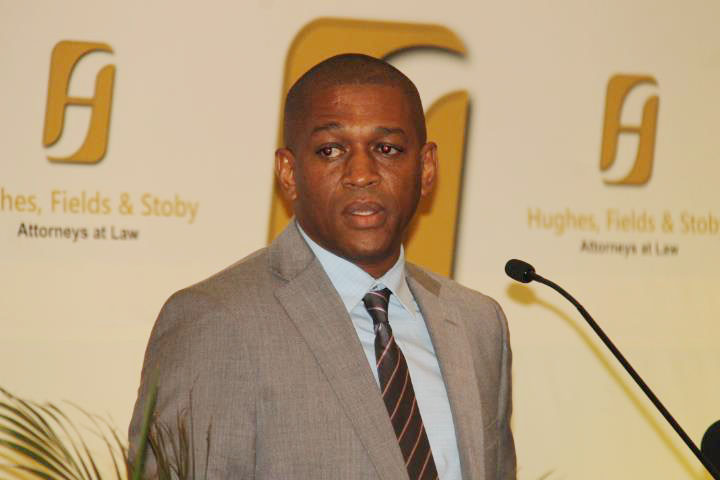Head of the Department of Energy (DoE) Dr. Mark Bynoe yesterday announced the completion of a best practice Production Sharing Agreement (PSA) template, which is expected to guide future oil sector licensing.
Bynoe also told a press conference at the Ministry of Presidency that a legal review and gap analysis of existing oil and gas legislation is expected to be completed by the end of this month.
Bynoe said the DoE was able to complete the development of the best practice PSA template in December and it is going to be used in the new licensing round. He emphasised that the template is, as the name implies, a template, and could be varied given differing conditions.
“As a best practice template, it would be the best practice for Guyana. But if all of those requirements are enforced, we will have the best PSA but not very many investors. It will always be a balancing act in terms of what Guyana wants and how Guyana intends to proceed with what Guyana wants,” he said.
A PSA modelling toolkit was also developed to allow probabilistic scenario modelling of the current PSAs and the development of a new model contract. He explained that the toolkit will help to design future licensing round strategy through varying the assumptions under which those strategies will be developed. It will also define the approach for deep water, shallow water and onshore licensing together with modelling PSAs that will be offered.
“Given the volume of procurement actions and given the size of some of the procurement actions, the department has developed a comprehensive procurement manual that aligns with the rudiments of the National Procurement and Tender Administration Board and multilateral donor institutions,” Bynoe also noted.
He further explained that the DoE is aiming for the primary legislation to be more robust in areas such as local content as well as the decommissioning of rigs and the template generally seeks the best practices and will also look at issues related to royalties.
“What will be the best practice for royalties, what may be the best practice for profit sharing, what will be the best practice in terms of operational health and safety, and you vary those… If you want the best practice for royalties and profit sharing, clearly as a potential investor one would want to know, ‘What’s in it for me?’ Those are all the best practices clauses and we will have to look at what will be most contextually relevant for Guyana when negotiations start,” he added.
Oil and gas Adviser Matthew Wilks added that the ultimate intention with the best practice template is to craft production sharing contracts that can be applied to different investment climates, such as deep water and onshore.
Wilks further explained that the new PSA template will improve the government’s take overall by instituting elements such as ring-fencing and a more progressive regime as it relates to oil price increases. The template will also look at closing off potential taxation and value-loss loopholes and “…A general tightening up that will give the government more opportunities to have a say as the investment proceeds from exploration to development and production and the give the government more of a seat at the table.”
Given the developments as it relates to the PSA template, Bynoe was questioned on whether he is of the opinion that the PSA with Exxon subsidiary Esso Exploration and Pro-duction Guyana Limited should be renegotiated, particularly as it relates to the 2% royalty.
“Again, the Department has been on record saying that it does respect the sanctity of the contract. We’ve gone over this multiple times and the implications for renegotiations are many. Let’s start out by first looking broadly at what renegotiations means. You have to have two parties who are willing to renegotiate. It’s not just an issue with Guyana deciding it wants to renegotiate and it proceeds in that direction,” he stated.
Bynoe also noted that renegotiation will also impact investors’ confidence in terms of whether the rule of law is being followed and as a result the DoE is not discussing renegotiation and will continue to engage the operators to ensure that Guyana receives its maximum possible value from the resources and based on the contract signed.
In need of revision
Meanwhile, Bynoe noted that the DoE and sister institutions, such as the Environmental Protection Agency (EPA), the Guyana Revenue Authority (GRA), the Audit Office, the Attorney General’s Chambers, the Civil Defence Commission (CDC) and the Ministry of Social Protection, have been receiving assistance and through the Ministry of Finance significant loans have been agreed and are being finalised with the World Bank and the Inter-American Development Bank (IDB) for institutional strengthening and governance of the sector.
He said the Department’s roadmap, which outlines a management framework in association with other subsidiary agencies, was completed in December. “Specifically under the roadmap, one of the things we hope to achieve is a legislative review and update as outlined in our first press conference. The legal review and gap analysis of existing legislation is expected by the end of February, 2019 and that is because the primary legislation, the Exploration and Production Act of 1986, may have been suited for the purpose of that time but given where we are in 2019, that primary legislation is badly in need of revision,” Bynoe said.
He explained that this move will allow the Department to move on to the next phase, which involves drafting replacement or supplementary legislation.
“And I hasten to add here as well, it’s not just the Department of Energy that requires a legislative review or amendments. It’s all the other subsidiary entities because as we are very much aware, oil and gas is new for Guyana,” he said, while noting that organisations such as the Maritime Administration Department, the GRA, CDC, and EPA all need to look at current legislation and make the necessary amendments or, in some cases, replacements.





